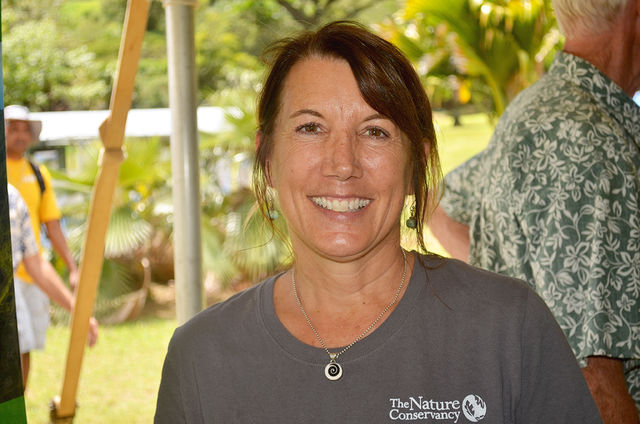HONOLULU — Using diversity as a tool for conversations in environmental conservation at the International Union for Conservation of Nature’s World Conservation Congress was a highlight for Melissa Fisher. The deputy director of The Nature Conservancy’s Kauai Program and co-leader
HONOLULU — Using diversity as a tool for conversations in environmental conservation at the International Union for Conservation of Nature’s World Conservation Congress was a highlight for Melissa Fisher.
The deputy director of The Nature Conservancy’s Kauai Program and co-leader of Women in Nature, TNC’s women employee resource group, coordinated conversations with colleagues in Asia Pacific and Hawaii for eight indigenous women leaders from the Pacific — each of whom told their stories at the event.
“Learning exchanges are a valuable way to share inspiration and tools across cultures, islands and projects,” Fisher said. “Major organizations from the IUCN to the Conservancy now understand that it is essential to address gender — and other diversity — to achieve greater conservation success.”
Highlighting the differences in humanity and finding ways to use those differences toward a greater goal is one way to achieve conservation at a higher level, she said.
“We aren’t all the same and we come to an issue from different viewpoints, which we can use to generate different conversation and come up with more solutions,” Fisher said.
The eight indigenous women leaders from Northern Australia, Papua New Guinea, and Solomon Islands met with indigenous women leaders from Hawaii to chat conservation, including Ulalia Woodside, executive director of TNC Hawaii.
“I was inspired by the stories shared by the indigenous women from the Solomon Islands, Australia and Papua New Guinea as we talked about our love for nature and the challenges we face caring for our island homes,” Woodside said.
Learning from the stories of the represented cultures was valuable to Evelyn Wight, also with TNC.
“One of the things that was specifically shared for the women in Hawaii is to learn from others’ mistakes,” Wight said.
None of the eight women knew one another at the beginning of the World Conservation Congress, Fisher said, but they all became fast friends during the knowledge cafes and other events.
“Visitors learned about how in Hawaii, managing natural resources requires a mauka-to-makai approach — ridge to reef,” Fisher said. “For example, on Kauai, TNC is working to protect the mauka watershed areas, which allows the rain and mist to filter down through the native trees, plants and mosses and soak into the land, helping to prevent muddy runoff.”
Each of the eight women that joined together for the conversation is leading efforts to restore natural systems, replenish native species, and preserve native culture. The meeting gave them the opportunity to compare notes on methods.
The biggest impact in the learning exchange, Fisher said, was encouraging everyone involved to keep their culture and nature intact.
“They say how in Hawaii so much has been lost, both in terms of Hawaiian culture and natural resources, that those working here must focus on restoration and reclamation,” Fisher said. “The women left with a renewed commitment to keep their cultures and natural resources healthy.”


